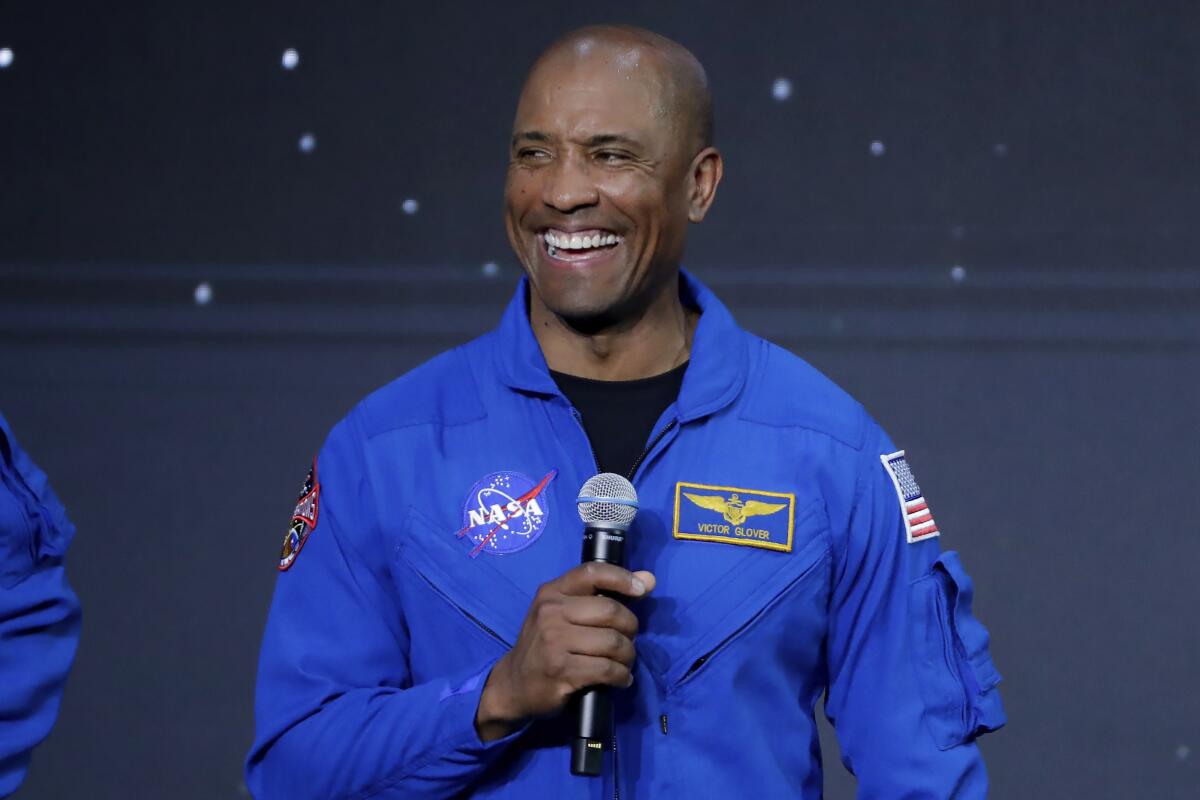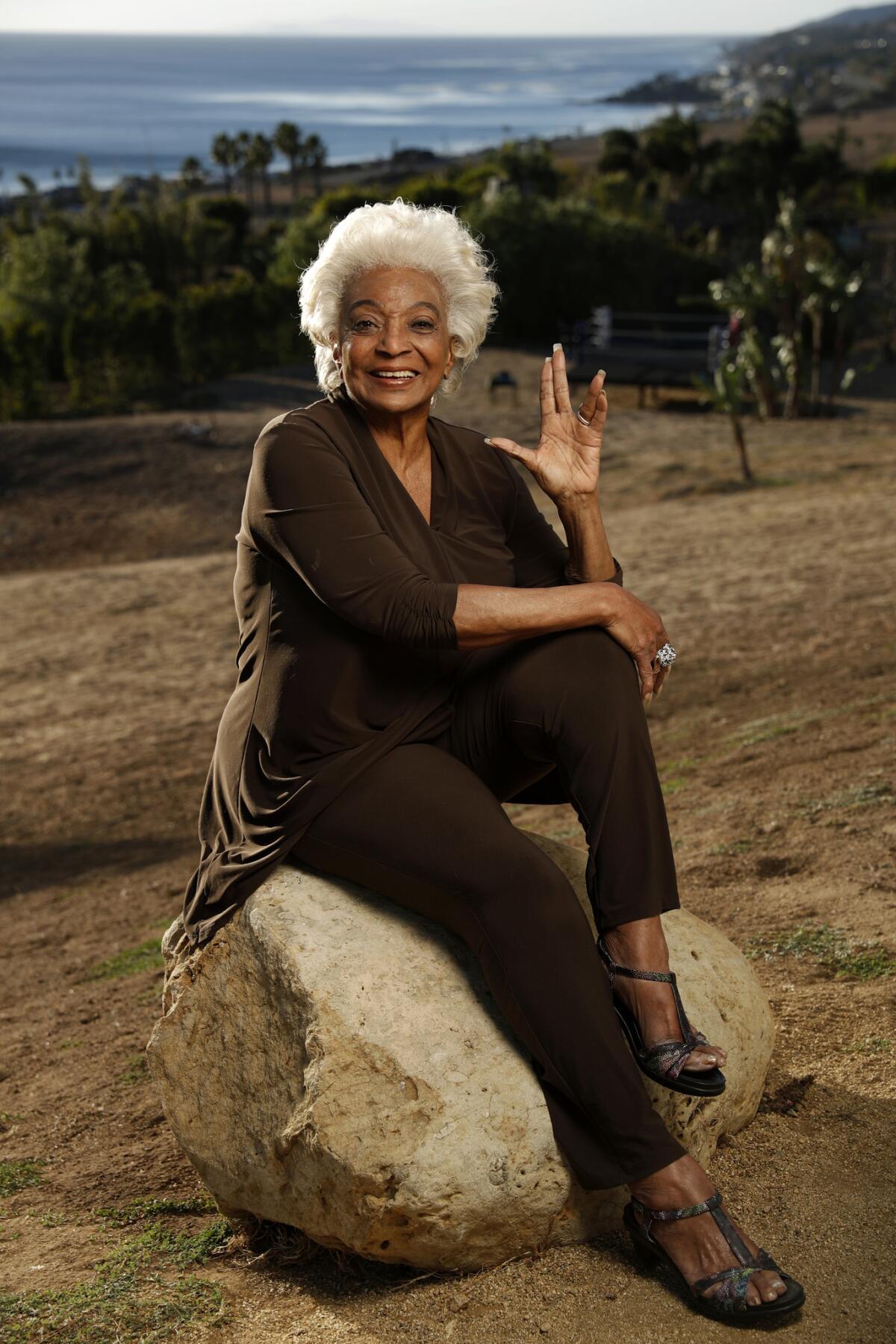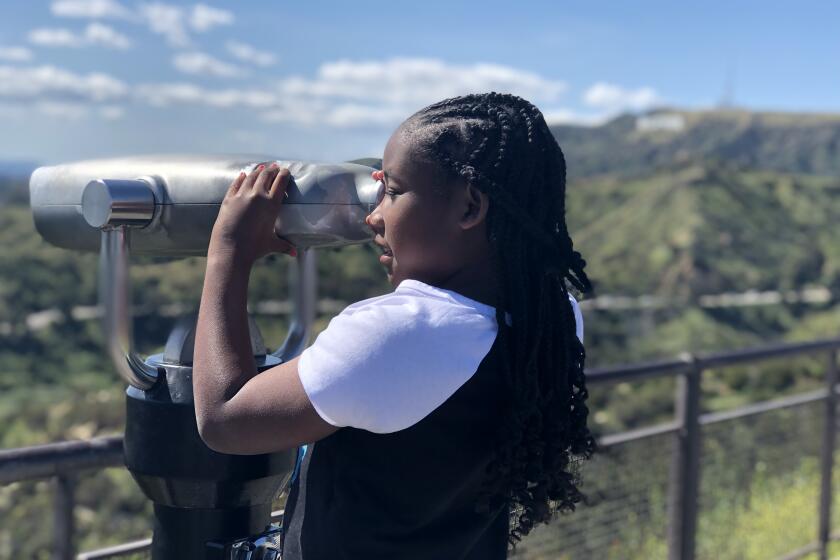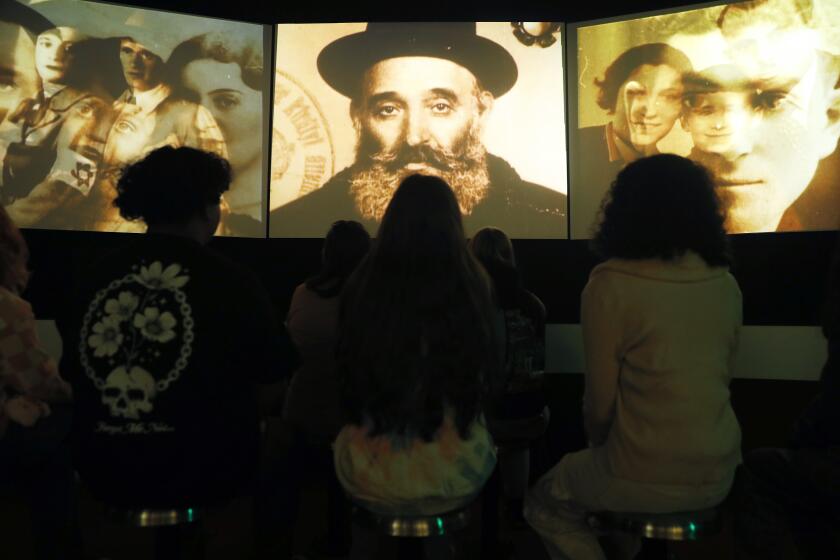A Black astronaut from California feels the weight of injustice on Earth
- Share via
NASA astronaut and California native Victor Glover Jr. prepares for his moon shot, but he’s reminded of how far America has to go to fulfill its promise of equality.
- Share via
NASA astronaut Victor Glover Jr. will travel farther into space than any Black person before him when he pilots the Artemis II lunar mission in 2024.
But he’s already embarked on a personal mission that hits closer to home on Earth.
He wants to take his fellow Americans to school and guide them deep into the nation’s psyche, to help them reflect on the paradox of a nation that has a track record of oppressing Black people sending him on a trailblazing trip around the moon.
Because of that legacy of racism, Glover says it’s his duty to impress upon people that his voyage will represent more than a scientific triumph.
Pomona native Victor Glover Jr.’s selection for NASA’s Artemis II moon mission isn’t just historic. His fellow Black Americans say it will change how the world sees them — and how they see themselves.
During a conversation over Zoom about the beauty of space flight and the contradictions of American life, the 47-year-old Pomona native says he recommends to audiences at his public speeches and his co-workers at NASA a choice set of reading, listening and viewing materials.
He starts with the U.S. Constitution, whose words resound with the false promise of equality that has led to so much racial upheaval.

“I like to highlight Article 1, Section 2, Clause 3, the part that says all people are accounted for the purposes of taxation and representation but everybody else is considered 3/5 of the person — remember, that’s still in there,” Glover says of the language referring to enslaved Africans.
“I encourage them to read the ‘Letter from a Birmingham Jail’ by Martin Luther King, the ‘Paranoid Style in American Politics’ by Richard Hofstadter,” he says.
“And then there are movies and music: ‘13th,’ about the 13th Amendment by Ava DuVernay, the Lupe Fiasco song ‘Shoes’ that’s about Ahmaud Arbery, who was murdered because he was out jogging and getting some exercise.”

Glover flashes a broad smile while discussing his work. He looks every bit the proud national hero with his smooth-shaven face and royal blue NASA jumpsuit. The Artemis II program will set the stage for humans to venture to Mars — a feat for the ages.
But he turns introspective when speaking about his own existence. Here he is preparing to pilot a spaceship that will also carry the first woman — Christina Hammock Koch — to the moon, feeling tugged by the pull of American history.
California archaeologist Ayana Omilade Flewellen sees the war on AP Black studies and other teachings as a sign that America isn’t ready to confront injustice.
He understands that to be Black in America — especially in an esteemed position like his — requires constantly holding yourself up as a positive example to give hope to your people.
During his time as the first Black astronaut to live long-term aboard the International Space Station in 2021, he celebrated Black history month with a phone call from Vice President Kamala Harris, a transformative figure in her own right as the first woman of color to hold that office.
“The exciting thing about being a first is that there is a prospect of there being a second, a third and a fourth, and it actually becoming normal,” Glover says. “I really look forward to the point where it’s not remarkable that a Black man is exploring the solar system — or running this country.”
When celebrating Black excellence, Glover knows his joys are never his own, though. Neither are his sorrows.
With every act of injustice, he thinks: “It could’ve been me.” That’s what he wanted his white friends and colleagues to take to heart after a white police officer killed George Floyd in 2020, and they asked him: “What can I do?”
Only a few months earlier, a white father and son gunned down Arbery in a racially motivated shooting.
“I think about him every time I’m out running,” Glover says.
Every instance of anti-Blackness strikes a chord deep within the whole community. That’s why Glover believes it’s essential for him to act as a kind of truth teller of the Black experience. It’s fundamentally different for someone who looks like him — who has both that promise of equality and America’s frequent failure to deliver on it in his DNA — to journey into space.

“It’s important for us to live up to the words in some of our foundational documents — of the people, by the people,” Glover says. “We’re exploring for all people, and now we can say we’re exploring with, or by, all people.”
Glover realizes that not everyone will share in the excitement over his lunar mission or revel in its symbolism. Black Americans have had a complicated outlook on space exploration. It has been seen as a source of inspiration and a distraction.
Black people were still fighting for the right to freely vote, eat and sleep wherever they wanted and attend integrated schools when President Kennedy vowed in 1962 to land the first human on the moon.
The spike in antisemitism and other hate crimes in L.A. is grim, but a Jewish neighborhood in L.A. offers glimmers of hope.
Many Black activists decried the massive spending dedicated to an Apollo lunar program that in the end would send only white men to Earth’s sole natural satellite. Poverty, racial strife and police violence were crippling Black communities.
That resentment cuts through Gil Scott-Heron’s 1970 spoken-word piece, “Whitey on the Moon,” a favorite work that Glover recommends to his NASA colleagues: “The man jus’ upped my rent las’ night. (‘cause Whitey’s on the moon) No hot water, no toilets, no lights. (but Whitey’s on the moon).”
“One of my first speeches was to my colleagues to tell them, ‘Hey, remember who you’re talking to — little me, when I was a kid, I didn’t feel connected to this,’” Glover says. He got personal with his peers, he says, “to help them broaden their understanding of what America is.”
“We need to understand that perspective.”
At the same time, Black Americans have long embraced the power of the cosmos to liberate the spirit — transforming the empty expanse of space into fertile territory brimming with new possibilities and luminous futures.
“You’re a shining star/ No matter who you are/ Shining bright to see/ What you could truly be,” sang Earth, Wind & Fire.
Jimi Hendrix daydreamed about space while growing up in the Seattle area and took on the persona of a righteous alien in the prelude to his 1967 song “Up From the Skies.”
Some civil rights leaders of the 1960s understood the power of space to unlock the potential of the Black community, Glover says.
“I’m not sure if many people know, but Nichelle Nichols, Lt. Uhura from ‘Star Trek,’ there’s a story that she was considering leaving the show,” he says of the pioneering Black actor, who died in 2022 and whose ashes will be sent into space on United Launch Alliance’s privately owned Vulcan rocket.
“Martin Luther King convinced her to stay because of what she represented and who she represented.”

“She became one of biggest advocates for racial and gender diversity in NASA,” Glover says.
Realizing that so many since that era have sacrificed and shattered racial barriers — including 14 other Black astronauts — Glover says it’s even more gratifying to pilot the first crewed U.S. lunar mission in half a century.
“I’m the fruit of the labor — and the seed for the next generation as well,” he says.
As Glover shoots past Earth’s atmosphere and sails 238,900 miles to the moon, his body will become weightless. But he knows his soul will be heavy.
More to Read
Sign up for Essential California
The most important California stories and recommendations in your inbox every morning.
You may occasionally receive promotional content from the Los Angeles Times.















